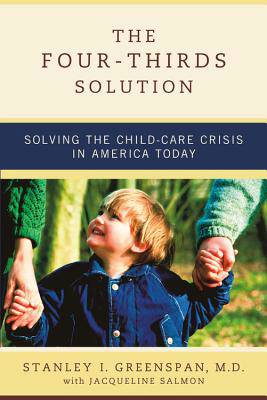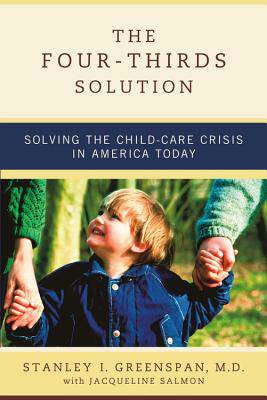
- Afhalen na 1 uur in een winkel met voorraad
- Gratis thuislevering in België vanaf € 30
- Ruim aanbod met 7 miljoen producten
- Afhalen na 1 uur in een winkel met voorraad
- Gratis thuislevering in België vanaf € 30
- Ruim aanbod met 7 miljoen producten
Zoeken
The Four-Thirds Solution
Solving the Child-Care Crisis in America Today
Stanley I Greenspan, Jacqueline Salmon
€ 29,95
+ 59 punten
Omschrijving
Long recognized for his brilliant insights into the emotional and intellectual development of infants and young children, Dr. Stanley Greenspan argues that parents, not teachers or caregivers, can most effectively encourage this development. In order for parents to do this, however, society must first face an unrecognized dilemma of major proportions. While Dr. Greenspan's research demonstrates that children in the first few years of life need intense one-to-one nurturing to develop their full cognitive and emotional abilities, over 50 percent of families are relying on out-of-home care that, for the most part, does not provide such nurture. In order to resolve this dilemma, he offers a radical redefinition of family life. Without suggesting that either parent give up a career, he presents a wide variety of practical solutions that make children the top priority-and the equal responsibility-of both parents. He vividly describes "tag team" care, serial careers, other ways to balance at-home care and daycare, ways to make the new technologies that allow working at home a benefit for both adult and child, and the "four-thirds solution," in which both parents work two-thirds of the time.A Merloyd Lawrence Book
Specificaties
Betrokkenen
- Auteur(s):
- Uitgeverij:
Inhoud
- Aantal bladzijden:
- 272
- Taal:
- Engels
- Reeks:
Eigenschappen
- Productcode (EAN):
- 9780738207674
- Verschijningsdatum:
- 17/10/2002
- Uitvoering:
- Paperback
- Formaat:
- Trade paperback (VS)
- Afmetingen:
- 141 mm x 216 mm
- Gewicht:
- 358 g

Alleen bij Standaard Boekhandel
+ 59 punten op je klantenkaart van Standaard Boekhandel
Beoordelingen
We publiceren alleen reviews die voldoen aan de voorwaarden voor reviews. Bekijk onze voorwaarden voor reviews.











